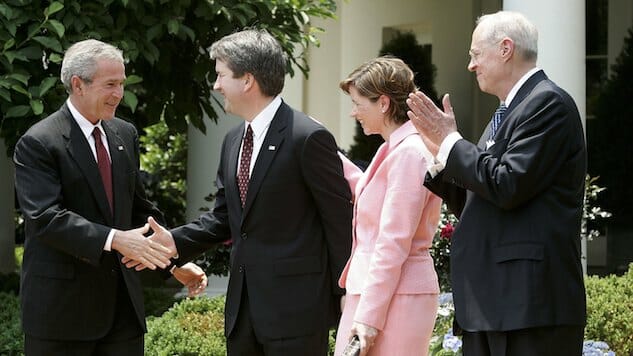Supreme Court Nominee Brett Kavanaugh Thinks the President Can Ignore Laws He Doesn’t Like
Photo by Alex Wong/Getty
In 2013, President Trump’s Supreme Court nominee Brett Kavanaugh stated that it’s a “traditional exercise” for a president to ignore new laws passed by Congress if the White House believes they are unconstitutional. For Democrats, knowing Kavanaugh’s position on giving Trump total power makes the future look even more bleak.
Kavanaugh said that if the president signs a bill into law “and says these certain provisions in here are unconstitutional, and we’re not going to follow those provisions, that is a traditional exercise of power by Presidents.” This statement was in reference to President George W. Bush’s controversial “signing statements.” A signing statement takes place when a bill has been passed by Congress and arrives on the president’s desk and he signs it into law, but adds notes addressing sections of the bill he deems to be unconstitutional. Basically, a president can bypass laws passed by Congress without vetoing them, which would allow congress to override the president’s decision.
Bush’s use of signing statements were often condemned by critics for abusing power and ultimately ignoring laws passed by Congress. Bush objected to over 500 provisions in more than 100 pieces of legislation passed by Congress. Bush’s signing statements were often on legislation that discussed the war on terror, affirmative action programs and even bills that created basic qualifications for executive appointees. One of his most controversial signing statements took place while Kavanaugh was serving as the White House staff secretary. This particular signing statement was on a torture ban bill which outlawed the torture of detainees. In the statement, Bush declared he could override and bypass this new legislation.
In an Aug. 13, 2013, opinion Kavanaugh wrote, “If the President has a constitutional objection to a statutory mandate or prohibition, the President may decline to follow the law unless and until a final Court order dictates otherwise.” He wrote a similar opinion in 2011. Sen. Chuck Schumer (D-NY) said, “Understanding the nature of his involvement in those actions is absolutely critical to evaluating the type of justice he would be on the bench. If Republicans continue to stonewall, the American people will wonder what they are hiding.”
Many allies of Kavanaugh have pointed to the fact that President Obama once said, “For nearly two centuries, Presidents have issued statements addressing constitutional or other legal questions upon signing bills into law.” However, a law professor at the University of Texas and CNN analyist Stephen Vladeck said: